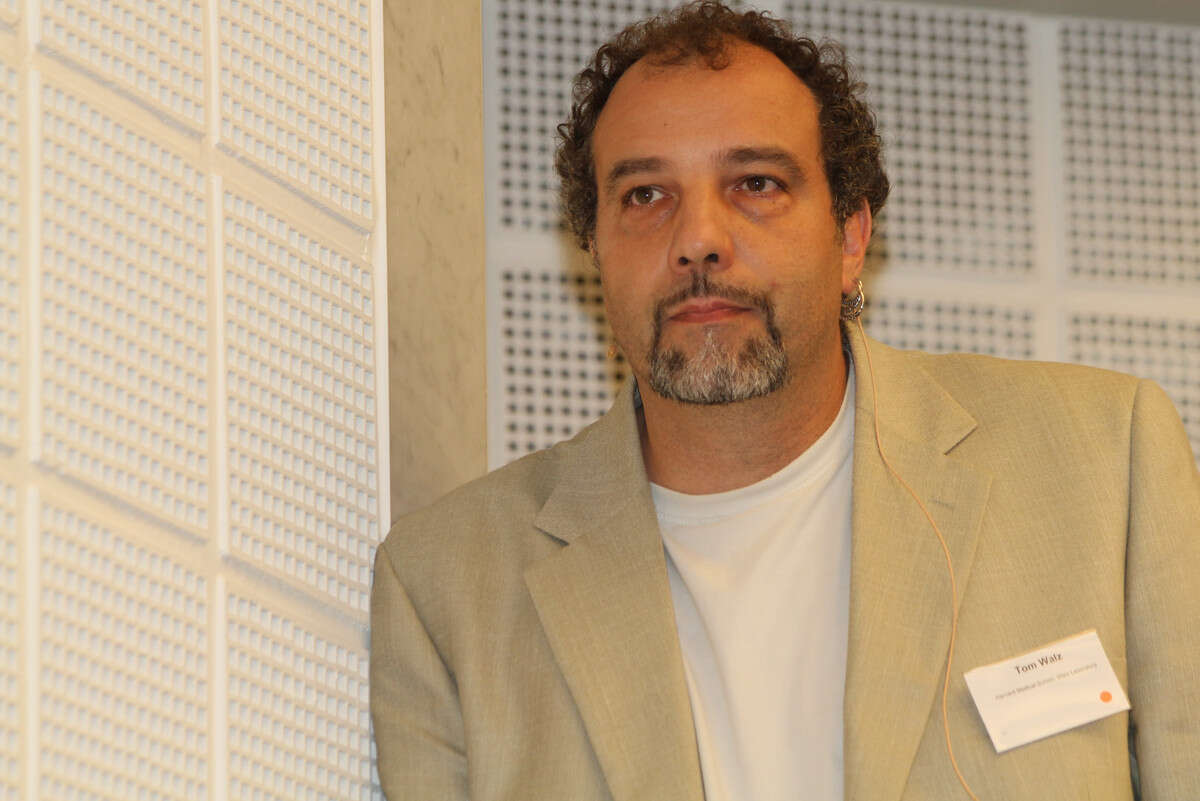What is a shogun doing in a laboratory?
May 2013
Shogun in the history of Japan was the title applied to a military general leading an army of samurais. Today, a certain shogun and his samurais seem to play an important role in the laboratory of Biozentrum Alumnus Thomas Walz, Professor of Cell Biology at the Harvard Medical School. ALUMNInews asked him about his academic career, his roots in the Biozentrum and of course his relationship with the Japanese culture?
What's all about the Japanese way of the Walz lab you presented for probably over a decade on your website?
My PhD supervisor, Prof. Andreas Engel, gave me the opportunity to work for several months in Prof. Yoshinori Fujiyoshi's laboratory in Japan. This was the beginning of my lasting fascination with Japan, the Japanese people, and the Japanese culture that is so different from ours.
What is your current topic of research?
I use molecular electron microscopy to determine the structure of membrane proteins in their native environment, the lipid bilayer, and to study how macromolecular complexes perform their function.
Why did you become fascinated by electron microscopy?
During a block course at the Biozentrum, we looked at T4 viruses in the electron microscopy. I was amazed by how proteins can assemble by themselves into such complex machines, and I was hooked on electron microscopy, which allowed me to see these intricate structures.
Was there a specific moment in which you decided to become a researcher?
I always wanted to become an explorer and to see things nobody has seen before. As I grew older, I realized that becoming an explorer was not a realistic option. I therefore made the decision to study biology at the Biozentrum. In a way, as an electron microscopist, I now do see things nobody has seen before.
What made you decide for an academic career and have you ever thought about working in industry?
I never thought about anything else than academic research. My interests have always been in very basic science. In recent years, however, I have become more interested in ways to translate basic knowledge to the development of cures, and I am now in the process of starting my first collaboration with a biotechnology company.
Have you ever faced unforeseen obstacles in your research career?
In virtually every research project one encounters unforeseen obstacles. For me it is the greatest fun of academic research to find imaginative ways to overcome the problems and to arrive at the correct answer.
Are you a planner of your professional career or has it developed rather by chance?
I can definitely say that my career developed completely by chance. The only conscious decision I ever made was to stay in Europe. But that did not exactly work out as planned. Fourteen years ago you moved to Boston.
What do you appreciate most about the USA and what do you miss?
I most appreciate the scientific freedom and complete independence I had from the very beginning, but I miss the cultural variety of Europe.
The USA is one of the most attractive places for researchers worldwide. Why is this so?
What makes the USA attractive to me is that in places like Boston, San Francisco and New York, the research community is simply amazing, both in size and quality.
What experiences have you taken on your way from the Biozentrum into the wider world?
My education at the Biozentrum instilled in me the value of having a broad and solid basis of knowledge, and of thinking clearly and working hard. I still benefit from what I learned during my time at the Biozentrum over two decades ago.
You left the Biozentrum more than 15 years ago. As an alumnus how do you feel about the Biozentrum and which are your best memories of that time?
I still feel connected to the Biozentrum, which will always remain the starting point of my scientific career. I particularly enjoyed my time in Andreas Engel's group, which was full of enthusiastic and highly motivated people. They made it fun to work late into the night.
Do you still have many contacts to other Biozentrum Alumni ?
Unfortunately, I only have contact with few other Biozentrum Alumni, probably because we all live in different parts of the world and work in diverse research areas.
Would you mind telling us a special anecdote from your earlier days as PhD at the Biozentrum?
I ended up in Andreas Engel's group because I lost a coin flip for a PhD position in a different group. My career is built almost exclusively on such chance events, and this particular loss probably turned out to have been my biggest win.
Curriculum Vitae
Thomas Walz is Professor of Cell Biology at the Harvard Medical School and director of its two electron microscopy facilities as well as selected investigator of the Howard Hughes Medical Institute. He graduated at the University of Basel and received his PhD in biophysics at the Maurice E. Müller Institute at the Biozentrum in 1996. As a PhD student he participated in solving the structure of membrane proteins, in particular aquaporins, under the mentorship of Prof. Andreas Engel. He then went on to postdoctoral research at the Krebs Institute at the University of Sheffield (UK) and joined the faculty of Harvard Medical School as an Assistant Professor in 1999. In 2007 he was promoted to full professor, one year later he was selected as an investigator of the Howard Hughes Medical Institute. The structural biologist uses advanced techniques of electron microscopy as a powerful tool to study the structure of a variety of biological molecules.



